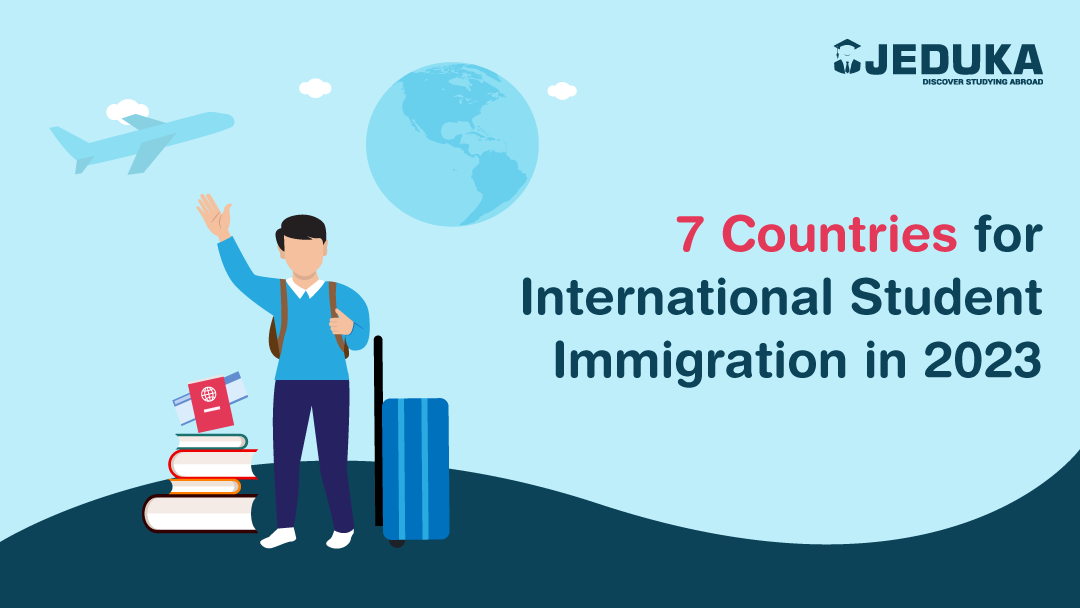Challenges You Face While Studying Abroad and How to Overcome It
Studying abroad is an exciting and life-changing experience, enabling you to experience a different culture, explore new places, and gain a fresh perspective on the world. However, studying abroad can also come with its own set of challenges. From dealing with a new language to making friends in an unfamiliar place to coping with homesickness, there are many obstacles to overcome in your quest to become an international student.

In this blog post, we will discuss the main challenges you may face while studying abroad and offer advice on how to overcome them. Whether you are preparing to study abroad or already packing your bags, this post will provide useful tips to help you make the most of your international education.
Managing Finances is Difficult!
Regardless of your best efforts to arrange your finances, create a budget, and keep track of your spending during your stay, managing the costs can sometimes be quite difficult. Even with flawless money management, it is still possible to run out of money or have less than you need. Make sure you are aware of the rules concerning your student visa before choosing a job. Check this out: Work Permit Rights for International Students Abroad
Depending on the country, you may be restricted to certain types and locations when it comes to employment. Make sure to keep an eye on your school's classifieds and various job boards for new openings. Additionally, you can consider freelance opportunities or part-time roles to help with managing your finances.
Finding the right accommodation isn’t easy.
Many times, on-campus housing fills up quickly, forcing students to look for alternate forms of housing at the university site. This frequently results in you having to spend a huge sum to book your desired accommodation.
It has frequently been seen that some Facebook groups conduct online fraud by posting fake pictures of homes and ultimately demanding a sizable security deposit in the process. These kinds of fraudsters target international students, costing them money. They discovered later that this kind of property was never ever real. In conclusion, it is crucial to look for accommodation from reputable, dependable suppliers.
Language barriers are challenging!
A language barrier is the most common challenge you will face while studying abroad. It's not just that you won't be able to understand what people are saying, but also that they may not understand you either. The good news is that there are ways to overcome this challenge.
First, remember that not all languages are created equal! If you are planning on studying Spanish or French, then start learning those languages now. They are much easier to learn than others because they have one of the largest numbers of speakers in the world, and thus more translations from English and other languages have been done for them.
Second, find a place where everyone speaks English as their first language so that you can practice your vocabulary and speaking skills with native speakers. This could be an immersion program where students live with local families or students who speak English at home every day. However, if there aren't any such programs available in your area, consider taking part in a study abroad program where classes are taught entirely in English. You can also try this out: Duolingo, an application for learning different languages.
Struggling with the time zone factor!
It can be very difficult to shift between two time zones on different sides of the globe while traveling, especially if you communicate regularly with family members who live in your home country. You should double-check which hour is appropriate for each time zone and make it a practice to call them either extremely early in the morning or possibly very late at night.
When installing timekeeping applications, be sure to consider all applicable time zones. To ensure a smooth transition to different time zones, it is important to familiarize yourself with the relevant time differences. The sooner you can become acquainted with this information, the more prepared you will be to handle any differences.
Feeling lonely, anxious, depressed.
Making friends in a new city is not always simple, especially if you are a shy or introverted person. The social and activity clubs at your university are where you should start. Throughout your time away, your mood may change occasionally. Assignments occasionally cause stress. Take care of your mental health the same way you would your physical health. Try to keep yourself calm, surround yourself with supportive friends, and engage in interesting activities. If necessary, look for help from a counselor or psychologist to discuss the circumstances that contributed to your anxiety and depression.
Getting Lost in a Foreign Land
No matter how many maps you look at, you risk getting lost in a busy marketplace or a deserted lane. Keep yourself cool in these situations. With helpful maps, you should be ready for any adventure you may face across the city. Make sure to write in the local tongue any phrases that will be useful for your circumstances. For example, "Help, I'm lost," or "Can you direct me to the nearest hotel, university, or bus stop, "Travel guidebooks are especially useful and usually have a section dedicated to this issue. If you enjoy traveling, keep enough cash on hand for unexpected expenses as well as local helplines' phone numbers.
Sudden Cultural Shock
The sudden change in culture may have a major impact on you as well. Everything from the food and customs to the transportation methods and fashion sense may be different from what you are used to. Unfortunately, this culture shock can sometimes result in dissatisfaction, worry, and homesickness. Even in situations where you are going about your regular daily responsibilities, these variances can cause significant amounts of stress if you are not prepared to handle them.
The best way to overcome this is by letting go of expectations and being open to learning about new things. If you keep thinking about why something isn't fitting well or what is wrong with the situation, then it will be harder for you to adapt and enjoy your stay there.
Fear of missing out
When you are thousands of miles away from all your loved ones, the fear of missing out significantly increases. You feel as though you are missing out on all of the significant events taking place all around you. Try to limit your online browsing time. Spend less time on social media accounts and concentrate on one hobby.
Feeling Like an Outsider
There are times when you may feel completely lost. You may not have ever felt so disconnected or alone. Make at least one local friend. Try to make real connections, especially across cultural barriers. Instead of feeling alone and awkward in your new country, this friendship might help you start feeling secure and at ease.
The feeling of being Homesick
Being away from your loved ones can make you feel quite homesick. Being bored will have a significant negative impact on you, so it is always advisable to stay active. You need to make friends, especially with other students who are experiencing the same things, and take in as much of your new surroundings as you can. Your time spent worrying about what you've left behind will lessen as you get more involved in your daily tasks.
Climate Uncertainties
No matter how much internet research you do before studying abroad, it is challenging to forecast the weather until you arrive at that specific location. What you might wear today depends on a number of factors, including the indoor environment, the city infrastructure, and even regional features. Plan to pack only the absolute necessities and purchase the rest when you arrive. If money is an issue, look for used clothing shops to find what you need.
Managing Academic Expectations
Always, new experiences will be more exciting. You might wish to try out a lot of new activities while living away from home. All you have to do is get to actively work. Use the planner, to-do list, and calendar apps to keep track of all your academic requirements.
Not able to Have your Comfort Food
Studies have shown that university students who study abroad notice a significant shift in the local food. Every culture places a significant emphasis on food, and the flavors and tastes of the many foods you have can vary greatly. Being separated from your go-to foods can be challenging at times because international cuisine varies greatly.
Safety
Safety is one of the most important factors when it comes to studying abroad. There are many things that can happen in a foreign country that you would not expect, which can be dangerous. There are also some safety tips you should follow while studying abroad:
- Always keep your passport with you
- Keep track of your money and other important documents
- Be aware of the surroundings and the people around you
- Never travel alone at night
Making Friends is Difficult
Making friends is difficult, especially if you are surrounded by individuals of other cultures and religions who speak different languages. In some situations, communication might be very difficult. Finding people who share your perspective can be challenging because different people are likely to come to study with you. Be prepared to spend time alone and choose enjoyable hobbies till you meet people who can be your friends.
Lack of Opportunities
Lack of opportunities for career advancement can be a serious hindrance. International students may experience significant difficulties because they must compete with many other students from around the world for the finest offers. Your student visa time might be about to expire, and you might not receive a good opportunity. Therefore, if you do not excel at what you do, a lack of prospects can be a serious issue.
New learning styles to get Acquainted With
Every country has its own method of education. You can always broaden your intellectual horizons and improve your ability to adapt to other educational settings by studying abroad. There are various ways to teach, including the Authority Style, the Facilitator Style, and the Delegator Style. Some students could find it challenging to adjust to a new teaching method in a foreign country. It is always preferable to get an idea of your preferred learning method before enrolling in a course.
No Support From Friends and Family
Families and friends who often provide support for you perhaps live thousands of miles away. This will be a significant difficulty, especially in the early months of your study abroad program. Again, though, you will ultimately develop a new support system, and finally, everything will be perfect.
Not finding the right work options
Finding the ideal career is not always simple, and landing your desired position abroad might be challenging. Additionally, depending on the country where you desire to apply, visa policies can vary across a number of nations. While some countries still have unresolved concerns, others have severe visa requirements that require detailed records.
It is also not that simple to identify the proper opportunity. Despite the abundance of alternatives, it is occasionally difficult to locate acceptable employment due to feelings of homesickness, loneliness, or language barriers.
If you are not sure where to start looking, ask other people who have studied abroad or talk with an advisor at your college or university about what programs are available for you. You can also check this out: 7 Countries for International Student Immigration in 2023
Laundry Struggles are Tiring
Laundry management can be quite hectic and difficult. The effort of separating light and dark-colored clothing is real if you have never done this before. Watch the temperature of your water because hot water might cause some materials to shrink. To learn how to wash a specific piece of clothing, pay close attention to the washing instructions listed on the clothing labels. Utilize reasonably priced local laundry services if installing a washing machine in your home is difficult.
Final Words
Studying abroad is a thrilling experience that provides students with the opportunity to further their education, discover new cultures and make lifelong memories. Many students, however, do not anticipate the range of challenges that come with studying abroad. From dealing with homesickness to adapting to a new educational system, these challenges can make the experience difficult to navigate. It is important for students to recognize the challenges they may face while studying abroad and have strategies in place to manage them.
Source:
https://www.jeduka.com/articles-updates/study-abroad/challenges-you-face-while-studying-abroad-and-how-to-overcome-it

.png)





.jpeg)


0 comments: